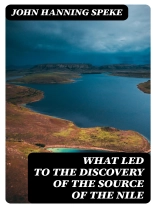In ‘What Led to the Discovery of the Source of the Nile, ‘ John Hanning Speke presents a detailed account of his explorations in East Africa, culminating in his contentious claim to have located the Nile’s source at Lake Victoria. Written in a vivid narrative style that blends scientific observation with personal reflection, the book captures the complexities of 19th-century exploration, including the intersections of geography, politics, and cultural encounters. Speke’s meticulous documentation of his journeys serves as both an adventure tale and an ethnographic study, providing insights into the landscapes and peoples he encountered, while grappling with the scientific fervor of the era. John Hanning Speke (1827-1864) was a British explorer driven by an insatiable curiosity and a desire to contribute to the age of discovery. His experiences in India and subsequent fascination with African geography fueled his ambition to locate the Nile’s source. Speke’s pioneering paths were marked by challenges, rivalries, and the weight of imperial expectation, which shaped his narrative as he sought not only geographical truths but also personal recognition. This book is essential for readers interested in exploration, colonial history, and the fervent spirit of inquiry that characterized the Victorian era. Speke’s work invites reflection on the interplay between reality and myth in the quest for knowledge, making it a compelling read for historians, adventurers, and literary enthusiasts alike.
Про автора
John Hanning Speke (1827–1864) was an officer in the British Indian Army and a Victorian explorer renowned primarily for his exploration of Africa and his quest for the source of the Nile River. Speke’s most significant contribution to the field of exploration was his discovery of Lake Victoria, which he correctly identified as the source of the Nile. This claim was initially disputed by fellow explorers but was later confirmed, cementing Speke’s place in the annals of exploration. Speke authored ‘What Led to the Discovery of the Source of the Nile’ (1864), a book that is a testament to his exploratory spirit and provides an in-depth account of the hardships and triumphs encountered on his journey through uncharted African territories. His writing is characterized by a narrative style that is detailed and, by many accounts, reflective of his indomitable will and the imperialistic ethos of his era. Today, Speke’s works not only serve as a historical record of exploration but also as a perspective on the complex dynamics between European explorers and the cultures and peoples they encountered. Despite his untimely death just days before a scheduled debate with Sir Richard Francis Burton regarding the Nile’s source, Speke’s legacy as a key figure in the age of exploration remains entrenched in both literary and historical scholarship.












